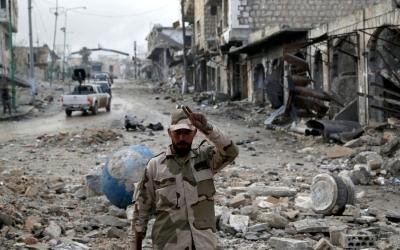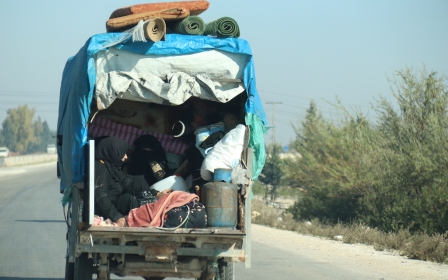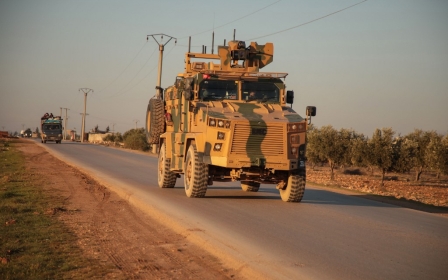Syrian government forces besiege Idlib's strategic Saraqeb

Syrian government forces completely surrounded the highly strategic Idlib province town of Saraqeb on Thursday, despite Turkish warnings not to advance.
"So far, government forces have not entered the city, there are now no clashes," Mohamed al-Bakour, an activist from the besieged town, told MEE.
According to Bakour, there is a small corridor out of the northern side of the town with no Syrian government forces present, “but it is always monitored”.
"The Damascus forces from the west are stationed in the village of Tronba, and yesterday they took control of the town of Afis, north of Saraqeb, so the remaining route out is very dangerous," he said.
Syrian state news agency SANA confirmed forces loyal to President Bashar al-Assad had surrounded Saraqeb and bypassed the Turkish observation points that rebel-backer Ankara had hurriedly set up in an attempt to slow the government’s assault.
New MEE newsletter: Jerusalem Dispatch
Sign up to get the latest insights and analysis on Israel-Palestine, alongside Turkey Unpacked and other MEE newsletters
Earlier this week, Turkish President Recep Tayyip Erdogan gave Assad’s forces an end-of-February deadline to halt its offensive and retreat.
More than 500,000 people have been forced to flee towards the Turkish border since the Syrian government began pushing north through Idlib province, the opposition’s last redoubt, in December.
“There are four newly created Turkish observation points around the town, which are now fully surrounded,” Khatib al-Adlabi, an activist from southern Idlib, told MEE.
"Today, a large Turkish convoy entered Taftanaz military air base, which is under the control of the rebels north of Saraqeb, but was subjected to direct artillery shelling by government forces."
Taftanaz is a large air field that oversees the M5 highway between Aleppo and Saraqeb.
“I think the Turkish convoy is preparing to establish a new observation point inside the air base, which is believed to be the potential destination for the advance of the Damascus forces after Saraqeb,” Adlabi told MEE
"Military action is being prepared by the rebels."
Shelling on Idlib city
Saraqeb is of great strategic importance, as it is the eastern entrance to Idlib and the nearby city of Ariha. It is also a link between the M5 and M4 international highways and links the eastern suburbs of Idlib city with the southern outskirts of Aleppo.
The advance of Syrian troops, backed by Russian air power, has rebel cut supply lines to the southern Aleppo countryside, increasing the likelihood of more villages and towns in opposition control collapsing.
Meanwhile, Idlib city has witnessed intermittent artillery shelling, in what appears to be an indication that expanding battles could soon concentrate of the largest rebel-held urban area and double the number of displaced.
'Now the town is completely free of fighters. We are preparing for military action and we will enter the town again, God willing'
- Mohammed al-Awad, rebel spokesman
More than three million people are trapped in Idlib, a northwestern province that lies on the Turkish border.
Video footage circulated on Wednesday and seen by MEE showed an opposition fighter inside Saraqeb saying that the town still had about 60 fighters left defending it.
According to the fighter, who belongs to the Saraqeb Revolutionary Front, Hay’at Tahrir al-Sham, the dominant force in rebel-held areas of Idlib, had sent no reinforcements to defend the town.
"The conditions in the city are extremely difficult and painful. Because of the small number of fighters, there is a great deficit defending the town, which is one of the largest towns known for revolutionary activities," he said, weeping.
However, Mohammed al-Awad, spokesman for the Saraqeb Revolutionary Front, told MEE those fighters had now retreated and left the town undefended.
“Now the town is completely free of fighters. We are preparing for military action and we will enter the town again, God willing,” he said.
Middle East Eye delivers independent and unrivalled coverage and analysis of the Middle East, North Africa and beyond. To learn more about republishing this content and the associated fees, please fill out this form. More about MEE can be found here.





